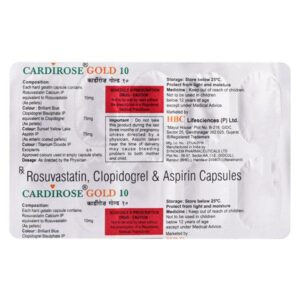CLOPIDOGREL + ROSUVASTATIN + ASPIRIN
Clopidogrel: Clopidogrel, commonly known by its brand name Plavix, is a medication used to prevent blood clots and reduce the risk of heart attack and stroke in individuals with certain heart or blood vessel conditions.
The mechanism of action of clopidogrel involves inhibiting the ability of platelets (tiny blood cells) to form clumps and form blood clots. It does so by blocking a specific receptor on the platelets called P2Y12 ADP receptor, which is involved in the platelet aggregation process.
The usual recommended dose of clopidogrel for preventing blood clots and related events is 75 mg per day. This may be taken orally with or without food. In acute coronary syndrome, such as after a heart attack, a higher loading dose of 300 mg may be administered initially, followed by 75 mg per day.
As with any medication, clopidogrel can cause side effects. Common side effects include easy or excessive bleeding, bruising, stomach upset, diarrhea, and rash. Less common but more serious side effects may include severe or prolonged bleeding, signs of an allergic reaction (such as rash, itching, swelling, severe dizziness), and symptoms of a blood disorder (such as unexplained fever, unusual tiredness, pale skin, signs of infection). It is important to seek medical attention if any unusual or severe side effects occur while taking clopidogrel.
Rosuvastatin: Rosuvastatin is a medication that belongs to the class of drugs known as statins, which are used to lower cholesterol levels in the blood. It is sold under the brand name Crestor.
The primary use of rosuvastatin is to treat high cholesterol levels, including both low-density lipoprotein (LDL) cholesterol, often referred to as “bad” cholesterol, and triglycerides. It is also used to increase high-density lipoprotein (HDL) cholesterol, commonly known as “good” cholesterol.
The mechanism of action of rosuvastatin involves inhibiting an enzyme called HMG-CoA reductase, which plays a crucial role in cholesterol production in the liver. By inhibiting this enzyme, rosuvastatin reduces the amount of cholesterol produced, causing a decrease in LDL cholesterol levels. It also increases the liver’s ability to remove LDL cholesterol from the blood.
The usual starting dose of rosuvastatin is 10 to 20 mg per day, with adjustments based on individual response and cholesterol levels. The medication can be taken with or without food, but consistency in administration is important.
As with any medication, rosuvastatin can cause side effects. The most common side effects include headache, muscle pain or weakness, abdominal pain, nausea, and constipation. Some individuals may also experience liver problems, indicated by yellowing of the skin or eyes, dark urine, or persistent fatigue. Rarer but more serious side effects may include allergic reactions, muscle breakdown, and kidney problems.
It is essential to consult a healthcare professional before starting rosuvastatin, as they can assess the need for treatment, determine the appropriate dose, and monitor potential side effects. Additionally, lifestyle changes such as a healthy diet, regular exercise, and weight management are often recommended alongside medication to optimize cholesterol-lowering effects.
Aspirin: Aspirin, also known as acetylsalicylic acid, is a widely used medication that belongs to the class of drugs known as nonsteroidal anti-inflammatory drugs (NSAIDs). It is primarily used as an analgesic (pain reliever), antipyretic (fever reducer), and anti-inflammatory agent.
Mechanism of Action:
Aspirin works by inhibiting the enzyme cyclooxygenase (COX), which is responsible for the production of prostaglandins. Prostaglandins play a role in triggering pain, inflammation, and fever. By inhibiting COX, aspirin reduces the production of prostaglandins, leading to its analgesic, antipyretic, and anti-inflammatory effects.
Uses:
Aspirin is commonly used to relieve mild to moderate pain caused by various conditions such as headaches, toothaches, menstrual cramps, and muscle aches. It is also effective in reducing fever and inflammation associated with conditions like flu and other viral infections. Additionally, aspirin is sometimes used as a preventive measure for cardiovascular diseases, as it inhibits blood clot formation by interfering with platelet aggregation.
Dose:
The recommended dosage of aspirin varies depending on the purpose of use. For pain relief and fever reduction, the usual adult dose is 325 to 650 mg every 4 to 6 hours as needed. However, it is important to follow the instructions provided by a healthcare professional or the product label. For cardiovascular prevention, lower doses ranging from 75 to 100 mg per day may be prescribed.
Side Effects:
Like any medication, aspirin also carries the risk of side effects. Common side effects of aspirin include stomach upset, heartburn, nausea, and indigestion. More serious side effects can occur, such as stomach bleeding, allergic reactions (ranging from mild rash to severe anaphylaxis), and an increased risk of bleeding, especially when taken in high doses or for a prolonged period. Aspirin should be used with caution in individuals with bleeding disorders, peptic ulcers, asthma, or kidney/liver problems.
It is important to note that aspirin should not be given to children and teenagers, especially those recovering from viral infections, due to the risk of developing Reye’s syndrome, a rare but potentially life-threatening condition.
It is recommended to consult a healthcare professional or pharmacist for proper dosage instructions and to discuss any potential interactions or contraindications before starting aspirin therapy.

